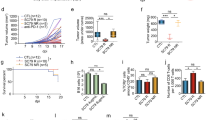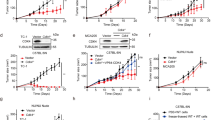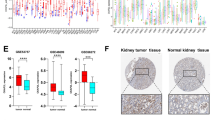Abstract
Background
S-phase kinase-associated protein 2 (SKP2) is a typical oncogene aberrantly overexpressing in a variety of cancer types, but it remains elusive whether SKP2 regulates the antitumor immunity of triple-negative breast cancer.
Methods
The efficacy of anti-PD-1 was evaluated in the orthotopic xenografts of immunocompetent mice models. The infiltration of cytotoxic T cells in tumor microenvironment(TME) were assessed by immunofluorescence staining. The levels of pro-inflammatory chemokines were analyzed by ELISA. The protein interaction was analyzed by co-immunoprecipitation and GST pull-down. The genomic instability was analyzed by fluorescent microscopy.
Results
SKP2 inhibition significantly improved the antitumor efficacy of immune checkpoint blockade (ICB). Furthermore, SKP2 inhibition activated the cGAS/STING signal pathway and induced the secretion of pro-inflammatory chemokines, thereby promoting cytotoxic T cell infiltration. Additionally, we identified CDC6, a DNA replication licensing factor as a novel substrate of SKP2 in addition to CDT1. SKP2 induced protein degradation of CDC6 and CDT1 through the ubiquitin-proteasome pathway. Conversely, SKP2 inhibition elevated CDC6 and CDT1 protein levels, which caused DNA aberrant replication, DNA damage and genomic instability, thereby resulting in the accumulation of cytosolic DNA, activating cGAS/STING signaling pathway and improving antitumor immunity.
Conclusion
SKP2 may be used as an effective therapeutic target to enable ICB antitumor immunotherapy.
Social media
Peng et al. found that SKP2 inhibition improved the antitumor immunotherapy by activating tumor cell-intrinsic immunity, thereby providing evidences that SKP2 may be used as an effective therapeutic target to enable ICB antitumor immunotherapy.
This is a preview of subscription content, access via your institution
Access options
Subscribe to this journal
Receive 24 print issues and online access
269,00 € per year
only 11,21 € per issue
Buy this article
- Purchase on SpringerLink
- Instant access to full article PDF
Prices may be subject to local taxes which are calculated during checkout






Similar content being viewed by others
Data availability
The raw data of RNA sequencing are deposited in the NCBI’s Bioproject database (BioProject ID: PRJNA1058858).
References
DeSantis CE, Ma J, Gaudet MM, Newman LA, Miller KD, Goding Sauer A, et al. Breast cancer statistics, 2019. CA Cancer J Clin. 2019;69:438–51.
Foulkes WD, Smith IE, Reis-Filho JS. Triple-negative breast cancer. N. Engl J Med. 2010;363:1938–48.
Bianchini G, Balko JM, Mayer IA, Sanders ME, Gianni L. Triple-negative breast cancer: Challenges and opportunities of a heterogeneous disease. Nat Rev Clin Oncol. 2016;13:674–90.
Yin L, Duan JJ, Bian XW, Yu SC. Triple-negative breast cancer molecular subtyping and treatment progress. Breast Cancer Res. 2020;22:61.
Hanahan D. Hallmarks of cancer: New dimensions. Cancer Discov. 2022;12:31–46.
Sanmamed MF, Chen L. A paradigm shift in cancer immunotherapy: From enhancement to normalization. Cell. 2018;175:313–26.
Zimmerli D, Brambillasca CS, Talens F, Bhin J, Linstra R, Romanens L, et al. MYC promotes immune-suppression in triple-negative breast cancer via inhibition of interferon signaling. Nat Commun. 2022;13:6579.
Zhang W, Liu W, Jia L, Chen D, Chang I, Lake M, et al. Targeting KDM4A epigenetically activates tumor-cell-intrinsic immunity by inducing DNA replication stress. Mol Cell. 2021;81:2148–65.e9.
Keenan TE, Tolaney SM. Role of immunotherapy in triple-negative breast cancer. J Natl Compr Canc Netw. 2020;18:479–89.
Emens LA. Breast cancer immunotherapy: Facts and hopes. Clin Cancer Res. 2018;24:511–20.
Gajewski TF, Schreiber H, Fu YX. Innate and adaptive immune cells in the tumor microenvironment. Nat Immunol. 2013;14:1014–22.
Pantelidou C, Sonzogni O, De Oliveria Taveira M, Mehta AK, Kothari A, Wang D, et al. PARP inhibitor efficacy depends on CD8+ T-cell recruitment via intratumoral STING pathway activation in BRCA-deficient models of triple-negative breast cancer. Cancer Discov. 2019;9:722–37.
Nagarsheth N, Peng D, Kryczek I, Wu K, Li W, Zhao E, et al. PRC2 epigenetically silences Th1-type chemokines to suppress effector T-cell trafficking in colon cancer. Cancer Res. 2016;76:275–82.
Dangaj D, Bruand M, Grimm AJ, Ronet C, Barras D, Duttagupta PA, et al. Cooperation between constitutive and inducible chemokines enables T cell engraftment and immune attack in solid tumors. Cancer Cell. 2019;35:885–900.e10.
Cai Z, Moten A, Peng D, Hsu CC, Pan BS, Manne R, et al. The skp2 pathway: A critical target for cancer therapy. Semin Cancer Biol. 2020;67:16–33.
Asmamaw MD, Liu Y, Zheng YC, Shi XJ, Liu HM. Skp2 in the ubiquitin-proteasome system: A comprehensive review. Med Res Rev. 2020;40:1920–49.
Nishitani H, Sugimoto N, Roukos V, Nakanishi Y, Saijo M, Obuse C, et al. Two E3 ubiquitin ligases, SCF-Skp2 and DDB1-Cul4, target human Cdt1 for proteolysis. EMBO J. 2006;25:1126–36.
Chan CH, Morrow JK, Li CF, Gao Y, Jin G, Moten A, et al. Pharmacological inactivation of Skp2 SCF ubiquitin ligase restricts cancer stem cell traits and cancer progression. Cell. 2013;154:556–68.
Inuzuka H, Gao D, Finley LWS, Yang W, Wan L, Fukushima H, et al. Acetylation-dependent regulation of Skp2 function. Cell. 2012;150:179–93.
Zhang W, Cao L, Sun Z, Xu J, Tang L, Chen W, et al. Skp2 is over-expressed in breast cancer and promotes breast cancer cell proliferation. Cell Cycle. 2016;15:1344–51.
Radke S, Pirkmaier A, Germain D. Differential expression of the F-box proteins Skp2 and Skp2B in breast cancer. Oncogene. 2005;24:3448–58.
Shen L, Qu X, Li H, Xu C, Wei M, Wang Q, et al. NDRG2 facilitates colorectal cancer differentiation through the regulation of Skp2-p21/p27 axis. Oncogene. 2018;37:1759–74.
Wang H, Hu S, Chen X, Shi H, Chen C, Sun L, et al. cGAS is essential for the antitumor effect of immune checkpoint blockade. Proc Natl Acad Sci USA. 2017;114:1637–42.
Ishikawa H, Ma Z, Barber GN. STING regulates intracellular DNA-mediated, type I interferon-dependent innate immunity. Nature. 2009;461:788–92.
Long ZJ, Wang JD, Xu JQ, Lei XX, Liu Q. cGAS/STING cross-talks with cell cycle and potentiates cancer immunotherapy. Mol Ther. 2022;30:1006–17.
Walter D, Hoffmann S, Komseli E-S, Rappsilber J, Gorgoulis V, Sørensen CS. SCF(Cyclin F)-dependent degradation of CDC6 suppresses DNA re-replication. Nat Commun. 2016;7:10530.
Cánovas B, Igea A, Sartori AA, Gomis RR, Paull TT, Isoda M, et al. Targeting p38α increases DNA damage, chromosome instability, and the anti-tumoral response to taxanes in breast cancer cells. Cancer Cell. 2018;33:1094–1110.e8.
Miller KN, Victorelli SG, Salmonowicz H, Dasgupta N, Liu T, Passos JF, et al. Cytoplasmic DNA: sources, sensing, and role in aging and disease. Cell. 2021;184:5506–26.
Harding SM, Benci JL, Irianto J, Discher DE, Minn AJ, Greenberg RA. Mitotic progression following DNA damage enables pattern recognition within micronuclei. Nature. 2017;548:466–70.
Mackenzie KJ, Carroll P, Martin CA, Murina O, Fluteau A, Simpson DJ, et al. cGAS surveillance of micronuclei links genome instability to innate immunity. Nature. 2017;548:461–5.
Li Y, Xie P, Lu L, Wang J, Diao L, Liu Z, et al. An integrated bioinformatics platform for investigating the human E3 ubiquitin ligase-substrate interaction network. Nat Commun. 2017;8:347.
Petersen BO, Lukas J, Sørensen CS, Bartek J, Helin K. Phosphorylation of mammalian CDC6 by cyclin A/CDK2 regulates its subcellular localization. EMBO J. 1999;18:396–410.
Wang JY, Liu GZ, Wilmott JS, La T, Feng YC, Yari H, et al. Skp2-mediated stabilization of MTH1 promotes survival of melanoma cells upon oxidative stress. Cancer Res. 2017;77:6226–39.
Ferrena A, Wang J, Zhang R, Karadal-Ferrena B, Al-Hardan W, Singh S, et al. SKP2 knockout in Rb1/p53-deficient mouse models of osteosarcoma induces immune infiltration and drives a transcriptional program with a favorable prognosis. Mol Cancer Ther. 2024;23:223–34.
Li X, Zhao Q, Liao R, Sun P, Wu X. The SCF(Skp2) ubiquitin ligase complex interacts with the human replication licensing factor Cdt1 and regulates Cdt1 degradation. J Biol Chem. 2003;278:30854–8.
Sanada S, Maekawa M, Tate S, Nakaoka H, Fujisawa Y, Sayama K, et al. SPOP is essential for DNA replication licensing through maintaining translation of CDT1 and CDC6 in HaCaT cells. Biochem Biophys Res Commun. 2023;651:30–38.
Ubhi T, Brown GW. Exploiting DNA replication stress for cancer treatment. Cancer Res. 2019;79:1730–9.
Qi X, Liu Y, Peng Y, Fu Y, Fu Y, Yin L, et al. UHRF1 promotes spindle assembly and chromosome congression by catalyzing EG5 polyubiquitination. J Cell Biol. 2023;222:e202210093.
Sokač M, Ahrenfeldt J, Litchfield K, Watkins TBK, Knudsen M, Dyrskjøt L, et al. Classifying cGAS-STING activity links chromosomal instability with immunotherapy response in metastatic bladder cancer. Cancer Res Commun. 2022;2:762–71.
Beernaert B, Parkes EE. cGAS-STING signalling in cancer: striking a balance with chromosomal instability. Biochem Soc Trans. 2023;51:539–55.
Raskov H, Orhan A, Christensen JP, Gögenur I. Cytotoxic CD8+ T cells in cancer and cancer immunotherapy. Br J Cancer. 2021;124:359–67.
Schadt L, Sparano C, Schweiger NA, Silina K, Cecconi V, Lucchiari G, et al. Cancer-cell-intrinsic cGAS expression mediates tumor immunogenicity. Cell Rep. 2019;29:1236–48.e7.
Li A, Yi M, Qin S, Song Y, Chu Q, Wu K. Activating cGAS-STING pathway for the optimal effect of cancer immunotherapy. J Hematol Oncol. 2019;12:35.
Acknowledgements
We appreciate Personal Biotechnology Co., Ltd (Shanghai, China) for RNAseq analysis.
Funding
This work was supported by grants from the National Natural Science Foundation of China (NSFC 81874096、NSFC 82303867 and NSFC 81572542), Research Project of Key Discipline of Guangdong Province (2019GDXK0010), Science and Technology Program of Guangzhou City (202201010161), Key team of basic and clinical research on tumor immunotherapy, Guangdong Pharmaceutical University, Project No. 2024ZZ10 and the 2024 Science and Technology Innovation Project of Guangdong Medical Products Administration “Research and Evaluation of Key Technologies for Drug Safety Risk Management” (No. 2024ZDZ10).
Author information
Authors and Affiliations
Contributions
YCP performed experiments, analyzed data and wrote the manuscript; XLQ performed experiments and wrote the manuscript; LYD, YHL and SZC participated in data analysis; JJH participated in animal studies and ELISA assays; RRZ participated in the real-time quantitative PCR; YMF participated in co-IP assays; LLY, TGD and YBY participated in Western Blot and ubiquitination assays; LX designed the project, supervised all experiments, analyzed the results, and wrote the manuscript. All authors read and approved the final manuscript.
Corresponding author
Ethics declarations
Competing interests
The authors declare no competing interests.
Ethics approval and consent to participate
All animal experiments were approved by the Institutional Animal Care and Use Committee (IACUC) at the Institute of Laboratory Animal Science (License Number:00320412), Guangdong Pharmaceutical University (Guangzhou, China), and conformed to the relevant regulatory standards.
Additional information
Publisher’s note Springer Nature remains neutral with regard to jurisdictional claims in published maps and institutional affiliations.
Supplementary information
Rights and permissions
Springer Nature or its licensor (e.g. a society or other partner) holds exclusive rights to this article under a publishing agreement with the author(s) or other rightsholder(s); author self-archiving of the accepted manuscript version of this article is solely governed by the terms of such publishing agreement and applicable law.
About this article
Cite this article
Peng, Y., Qi, X., Ding, L. et al. SKP2 inhibition activates tumor cell-intrinsic immunity by inducing DNA replication stress and genomic instability. Br J Cancer 132, 81–92 (2025). https://doi.org/10.1038/s41416-024-02909-y
Received:
Revised:
Accepted:
Published:
Issue Date:
DOI: https://doi.org/10.1038/s41416-024-02909-y



